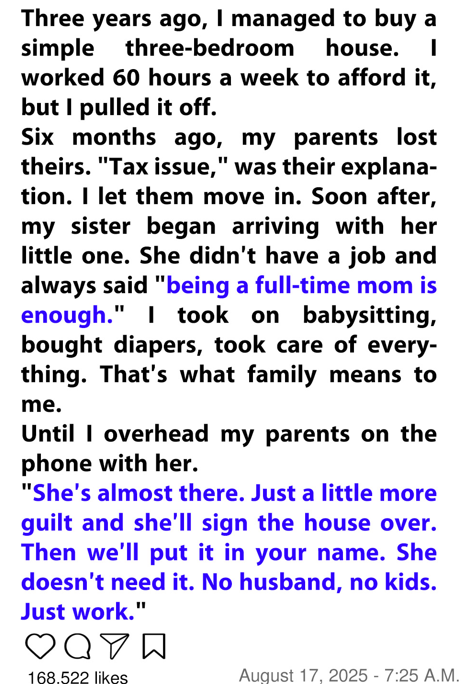For most of her life, she was the responsible one. Not the kind of “responsible” that earns gold stars or praise, but the kind that quietly shoulders the weight of a family’s dysfunction. By the time she was a teenager, she was paying bills, managing groceries, and tutoring kids just to afford a secondhand laptop. Her parents, meanwhile, were halfway to Vegas or buying festival passes—always forgetting to invite her.
She didn’t complain. Not then. She just figured someone had to be the grown-up, and that someone was her.
By thirty, she had built a quiet life. No husband, no kids, just a steady job in logistics and a modest three-bedroom home bought with her own savings. It was her sanctuary—earned, not gifted. She still helped her parents and younger sister financially, but she finally had peace.
Until the phone rang.
Her father’s voice was a mix of embarrassment and expectation: “We lost the house. Some unexpected tax thing. We’ve got thirty days.” Without hesitation, she offered her home. Old habits die hard.
She gave them the guest room, bought new linens, doubled the grocery budget. At first, it felt manageable. But soon, her sanctuary became a battleground of passive-aggressive comments, entitlement, and emotional manipulation. Her parents treated her home like a temporary inconvenience, not a lifeline.
Then came the moment that shattered everything.
She overheard her parents talking to her sister in the kitchen. They didn’t know she was nearby. “We’re just waiting to guilt her into signing the house over,” her mother said. “She owes us. After everything we’ve done.”
The words hit like a betrayal wrapped in entitlement. After everything they’d done? She had sacrificed her youth, her peace, her finances. And now, they were plotting to take the one thing she had built for herself.
She didn’t confront them immediately. She let the truth settle. It was painful, but clarifying. Her role in the family had never been about mutual respect—it had been about utility. She was the fixer, the provider, the fallback plan. And now, they saw her house not as her achievement, but as their inheritance.
So she made a decision.
She sat them down and calmly explained that things had to change. They would need to contribute financially. Respect boundaries. And most importantly, understand that her home was not theirs to claim. She wasn’t signing anything over. Not now. Not ever.
The fallout was messy. Her sister accused her of being selfish. Her parents played the guilt card. But she held firm. For the first time, she chose herself.
This wasn’t just a story about overhearing a cruel comment. It was about waking up to a lifetime of emotional labor and finally drawing a line. It was about reclaiming space—not just physical, but emotional.
She still loves her family. But love without boundaries becomes sacrifice. And she’s done sacrificing.


